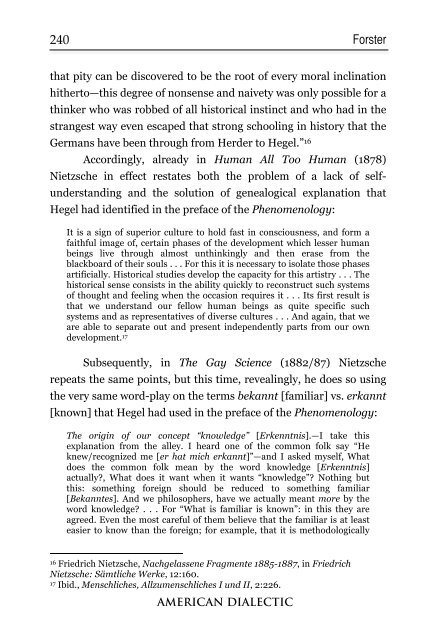Genealogy Michael Forster - American Dialectic
Genealogy Michael Forster - American Dialectic
Genealogy Michael Forster - American Dialectic
Create successful ePaper yourself
Turn your PDF publications into a flip-book with our unique Google optimized e-Paper software.
240<br />
AMERICAN DIALECTIC<br />
<strong>Forster</strong><br />
that pity can be discovered to be the root of every moral inclination<br />
hitherto—this degree of nonsense and naivety was only possible for a<br />
thinker who was robbed of all historical instinct and who had in the<br />
strangest way even escaped that strong schooling in history that the<br />
Germans have been through from Herder to Hegel.” 16<br />
Accordingly, already in Human All Too Human (1878)<br />
Nietzsche in effect restates both the problem of a lack of self-<br />
understanding and the solution of genealogical explanation that<br />
Hegel had identified in the preface of the Phenomenology:<br />
It is a sign of superior culture to hold fast in consciousness, and form a<br />
faithful image of, certain phases of the development which lesser human<br />
beings live through almost unthinkingly and then erase from the<br />
blackboard of their souls . . . For this it is necessary to isolate those phases<br />
artificially. Historical studies develop the capacity for this artistry . . . The<br />
historical sense consists in the ability quickly to reconstruct such systems<br />
of thought and feeling when the occasion requires it . . . Its first result is<br />
that we understand our fellow human beings as quite specific such<br />
systems and as representatives of diverse cultures . . . And again, that we<br />
are able to separate out and present independently parts from our own<br />
development. 17<br />
Subsequently, in The Gay Science (1882/87) Nietzsche<br />
repeats the same points, but this time, revealingly, he does so using<br />
the very same word-play on the terms bekannt [familiar] vs. erkannt<br />
[known] that Hegel had used in the preface of the Phenomenology:<br />
The origin of our concept “knowledge” [Erkenntnis].—I take this<br />
explanation from the alley. I heard one of the common folk say “He<br />
knew/recognized me [er hat mich erkannt]”—and I asked myself, What<br />
does the common folk mean by the word knowledge [Erkenntnis]<br />
actually?, What does it want when it wants “knowledge”? Nothing but<br />
this: something foreign should be reduced to something familiar<br />
[Bekanntes]. And we philosophers, have we actually meant more by the<br />
word knowledge? . . . For “What is familiar is known”: in this they are<br />
agreed. Even the most careful of them believe that the familiar is at least<br />
easier to know than the foreign; for example, that it is methodologically<br />
16 Friedrich Nietzsche, Nachgelassene Fragmente 1885-1887, in Friedrich<br />
Nietzsche: Sämtliche Werke, 12:160.<br />
17 Ibid., Menschliches, Allzumenschliches I und II, 2:226.


